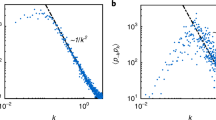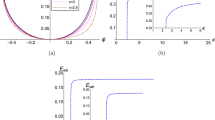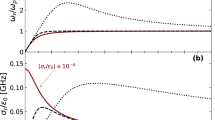Abstract
THE theory of magneto-hydrodynamic waves in a conducting liquid has been studied by Alfvén1 and his collaborators2, and applied particularly to the theory of sunspots. Recently attempts have been made to apply similar ideas to account for the heating of the solar corona3, and the generation of cosmic radiation4.
This is a preview of subscription content, access via your institution
Access options
Subscribe to this journal
Receive 51 print issues and online access
$199.00 per year
only $3.90 per issue
Buy this article
- Purchase on Springer Link
- Instant access to full article PDF
Prices may be subject to local taxes which are calculated during checkout
Similar content being viewed by others
References
Alfvén, H., “Cosmical Electrodynamics”, chap. 4 (Oxford, 1950).
Walén, C., Ark. f. mat., astr. o. fysik, 30 A, No. 15 (1944). Lundquist, S., Phys. Rev., 76, 1805 (1949).
Alfvén, H., “Cosmical Electrodynamics”, 151 (Oxford, 1950).
Richtmyer, R. D., and Teller, E., Phys. Rev., 75, 1729 (1949). Fermi, E., Phys. Rev., 75, 1169 (1949). Alfvén, H., Phys. Rev., 75, 1732 (1949); ibid., 77, 375 (1950).
Åström, E. (see preceding communication).
Schwarzschild, M., Astrophys. J., 104, 203 (1948).
Author information
Authors and Affiliations
Rights and permissions
About this article
Cite this article
HERLOFSON, N. Magneto-Hydrodynamic Waves in a Compressible Fluid Conductor. Nature 165, 1020–1021 (1950). https://doi.org/10.1038/1651020a0
Issue Date:
DOI: https://doi.org/10.1038/1651020a0
This article is cited by
-
Nonlinear dynamical magnetosonic wave interactions and collisions in magnetized plasma
Applied Mathematics and Mechanics (2020)
-
75th Anniversary of ‘Existence of Electromagnetic–Hydrodynamic Waves’
Solar Physics (2018)
-
Nonlinear evolution of kinetic Alfvén wave and turbulent spectra: effect of initial conditions
Astrophysics and Space Science (2014)
-
Equation of state of the system of Alfvén waves
Acta Physica Academiae Scientiarum Hungaricae (1977)
Comments
By submitting a comment you agree to abide by our Terms and Community Guidelines. If you find something abusive or that does not comply with our terms or guidelines please flag it as inappropriate.



